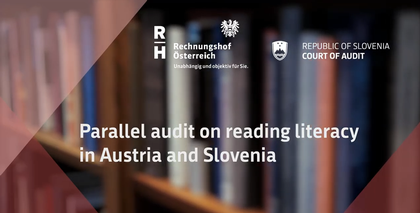Parallel audit on reading literacy in Austria and Slovenia
On 30 September 2020, the President of the Austrian Court of Audit, Margit Kraker, and the President of the Court of Audit of the Republic of Slovenia, Tomaž Vesel, held a meeting by videoconference to discuss the results of the joint project on promoting the reading literacy of children in Austria and Slovenia in the period of 2014 to 2018.
The Austrian Court of Audit and the Court of Audit of the Republic of Slovenia had agreed to engage in a joint project focusing on the reading literacy of children in Austria and Slovenia in the period of 2014 to 2018. To address the relevant issues and concerns in the field of children's literacy in their respective countries, the Supreme Audit Institutions have each designed and performed a separate performance audit, but agreed on a set of common reference points. Both Austria and Slovenia pledged to ensure that all youth achieve literacy by 2030 within the scope of the UN Sustainable Development Goal 4 (ensure inclusive and equitable quality education and promote lifelong learning opportunities for all).
Vital skill
Reading literacy has gained wider attention when it was recognised as an important element of an individual's employability and as a vital skill in the lifelong learning process these fast changing and technologically advanced times require of each individual. As a necessary skill for the development of all other forms of literacy, such as functional literacy, digital literacy, scientific literacy, technological literacy and academic literacy, to name a few, reading literacy is crucial for the personal and individual empowerment of each individual. It enables active participation of the individual in all areas of life and significantly improves the choices and possibilities for one's wellbeing and economic independence. The development of reading literacy starts in early childhood and continues with the most important stages throughout primary education. Different international studies have been designed to monitor the development of reading literacy in children at different ages (for example TIMSS, PIRLS, PISA), which amass a wealth of structured data and offer valuable insights and potential for further examination.
Both Supreme Audit Institutions have chosen the PISA study, the OECD's Programme for International Student Assessment, intended to evaluate educational systems by measuring 15-year-old school pupils' scholastic performance on mathematics, science, and reading as a reference point of the joint project. Both countries have been participating in the study for many years and in both countries the majority of the children reach the age of 15 years upon completion of compulsory primary education programmes. Thereby the results of the study offer valuable information and insights not only on the children's achievements but also on the role, impact and efficiency of the national education systems and policies in developing reading literacy in children.With respect to the identified national challenges and risks, the emphasis of the respective audit reports are slightly different.
The Austrian Court of Audit looked closely at the promotion of reading skills in primary and lower secondary schools in the school years 2014/15 to 2017/18. The Court of Audit of the Republic of Slovenia chose a system-based approach to identify the factors and their impact on developing reading literacy in children in Slovenia in the period of 2014 to 2018. The Austrian Court of Audit carried out an audit of the Federal Ministry of Education, Science and Research, the provincial school boards/education directorates of Lower Austria and Salzburg and the provinces of Lower Austria and Salzburg. The audit aimed at presenting the development of the reading proficiency of children as well as assessing the objectives and provisions with regard to the reading literacy of Austrian children, the organizational implementation of the promotion of reading skills in schools as well as measures and resources used to increase reading literacy. The Austrian Court of Audit addressed the lack of a comprehensive strategy for the improvement of reading literacy in primary schools and lower secondary schools and sees considerable room for improvement with regard to the promotion of reading skills in schools.
The Court of Audit of the Republic of Slovenia performed the audit at the Ministry of Education, Science and Sport, the Ministry of Culture, the National Education Institute Slovenia and the Slovenian Book Agency. The audit aimed to assess whether the goals and activities for developing reading literacy in children were designed and planned adequately, and whether these activities were performed efficiently. The Court of Audit expressed the opinion that the auditees have been partly efficient in designing, planning and performing activities for developing reading literacy in children and issued several recommendations to improve the operations in the future.
Audit Report: Reading Literacy in Children in the Republic of Slovenia
Audit Report: Promotion of Reading Skills in Schools (in German)




